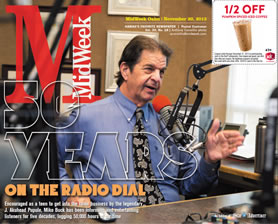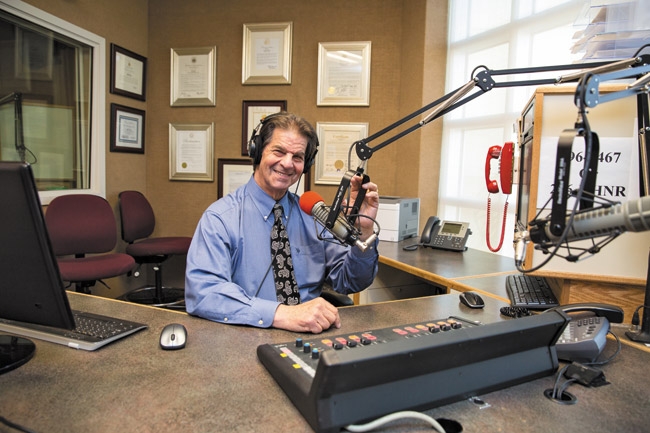50 Years On The Radio Dial
Encouraged as a teen to get into the radio business by the legendary J. Akuhead Pupule, Mike Buck has been informing and entertaining listeners for five decades, logging 50,000 hours of air time
Nothing upsets Mike Buck more than being called a disc jockey. “I’m a talk show host,” he insists.
Right, Mr. Buck. We got it. You don’t spin discs. You spin public opinion. That’s music to our ears.
Buck was on MidWeek‘s cover in 2004, and he returns this week to be spotlighted as a consummate communicator and venerable voice in our community. His 50-year broadcast tenure exceeds Hawaii’s best-known and reputedly highest paid radio voice, the late Hal Lewis, aka J. Akuhead Pupule.
Actually, Aku discovered Buck when the youngster was emceeing a Punahou class event. He commented to Buck’s dad, “Your kid should be in radio.”
Fifty years later, Buck has logged 50,000 hours of air time. That’s a lot of vocal power.
“I’ve got the gift of gab,” he says.
Today, the titan of talk reigns at a 12-by-12-foot studio on the second floor of Salem Media on North King Street. Equipped with a broadcast control panel, computer keyboard, monitors, microphones and a headset, it’s a far cry from his neophyte broadcast in 1963.
Station Break
“This is KZOO, 1200 kilohertz, Honolulu, Hawaii on the air.”
Buck was the first announcer on the local Japanese radio station. He was hired to do station IDs every half-hour.
“I didn’t speak a word of Japanese,” Buck reflects in amusement. “I earned 20 bucks doing live announcements for three or four hours.”
It was an auspicious start to an enduring radio career in Hawaii, Australia, Alaska and the Mainland.
Today his talk-story show is heard on KHNR weekdays from 6 to 10 a.m. Saturday mornings from 6 to 7 he hosts Hawaii’s only radio fishing show, Go Fish. He also hosts two health shows and is the national spokesman on 700 stations for NatureBee, a New Zealand vitamin supplement.
But it is his banter on current affairs that endears him to fans who wake up to his news reports, opinions and insights.
Topical Tonic
Lately, he’s had a lot of ammo in his arsenal of interactive debate: Obamacare, same-sex marriage, party politics, crime and terrorism.
“All I try to do is present a level playing field,” says Buck, who calls himself an “independent conservative.”
“I interview people using several styles,” he says. “If it’s a breaking news story, I only want the facts that one can share from personal experience. If it’s a politician, entertainer or business leader, I try to make them comfortable talking to me and ask questions related to relevant issues. If they supply me with a suggested list of topics, I usually toss it and go from the gut, asking what I think listeners would ask if they had the chance.”
It’s an art form that makes radio the most personal medium, even as the choice of communication devices has grown over the years.
“There’s been a paradigm shift in the way audiences interact with radio,” he states. “With social media and interactive polls online, as well as huge audiences using electronic devices like smart-phones, there is engagement on many levels.”
Broadcast technology, too, has changed dramatically. Gone are turntables, analog systems and face clocks on the wall. The digital age makes live broadcasting a mere “click” of the computer.
But “content” is still what listeners seek. On talk shows, they want points of view that stimulate public debate and flush out controversy. That’s particularly so during elections.
Don’t Touch That Dial
“As long as I have interesting issues that are compelling, I will have an audience that’s loyal,” says the 70-year-old broadcaster. “What makes a talk host successful is the willingness of newsmakers to talk to you. I’m the only guy in Honolulu who has interviewed all the governors and mayors since statehood.”
But, he claims, “Public figures are harder to interview because they tend to be too programmed.”
Which are his most memorable interviews? * Most fun: Bill Gates, Microsoft CEO. * Most emotional: Israel “Bruddah Iz” Kamakawiwoole in 1982, a couple of days after his older brother Skippy died.
“The interview was a tough one. We both were very emotional, and it was during that chat I think Iz realized what a big responsibility he had to continue with the rebirth of Hawaiian music in his generation.” * Most desirable: Larry King. “He’s the consummate interviewer.”
And if we brought a guy named Barack Obama into the studio, what would he ask him?
“Because we went to the same school (Punahou), I would ask him about the lily pond that’s at the center of campus and from which the school gets its name.
“We don’t see eye-to-eye on a lot of things,” Buck says of the sitting U.S. president. “I’m disturbed about how things are going in our nation’s Capitol. I would ask him for the truth and about his ideology.”
Would Buck ever consider running for office himself?
“I’ve been asked to run for political office three times,” he reveals. “I have declined because I don’t think I could do the dealing that’s done.”
The award-winning broadcaster, whose office is adorned with many commendations and proclamations, has a range of accomplishments and interests. His vast experience in family-owned resort retailing, real estate, commercial fishing, sports, scuba and diving, acting, charitable causes and home-building make him an expert in many fields.
Married 20 years to Jackie Collins-Buck, a Realtor with LIST Sotheby’s International Realty, the couple has two daughters, six grandchildren and two great-grandchildren. They reside in Portlock with two dogs, Nalo and Luna.
Asked how he’ll celebrate his half-century in radio, Buck hails the occasion as the “first day of the next 50 years.”
“Every day is a brand-new day,” he reflects. “I have no idea what’s going to happen, and I feel honored that people are interested in what I think of stuff.”
So his voice continues to boom over the airwaves with the wisdom of the ages coloring his articulate dialogue with listeners.
“I have mana’o (thoughts, ideas) to contribute,” he says. “Someone called me several days ago, admonishing, ‘You know, before you say things like that, you really ought to check with a kupuna.’
“You know what?” I said. “I am a kupuna!”
Therein lies the charm of radio’s Mike Buck. He is a straight-shooter on the issues of the day, drawing upon his journalistic sense of news and views. But he knows the responsibility he has to both inform and entertain audiences.
Radio-Go-Round
In the information age, there are many venues listeners use for connecting with opinion leaders. Podcasts, live-streaming audio, social media and good ol’ word of mouth challenge Buck to keep up with today’s dynamics of communications.
“I’m juggling lava here,” he declares.
Just when folks thought radio was going out of style, it has emerged one of the most reliable forms of information dissemination and relationship building. As with other forms of communications, including print, consumers are choosing new venues by which to get information and entertainment. Content is still the core product, and there is a demand for it as precisely, creatively and as personalized as consumers want it.
The growth of talk shows on both visual and audio media is testimony to this enduring art form. To aspiring hosts, Buck offers encouragement and urges the industry to cultivate the next generation of editorial voices.
“Getting into this business is tough with fewer opportunities,” he says. “I’m anxious to pass on the baton to someone who has that glint in his eye and who really gets what we do. That’s really key.
“If you have a calling, you have to answer,” Buck professes. “You’re not going to become the richest person in the world working in radio, but there is reward in turning off the microphone at the end of the day and saying, ‘That was good.'”
No more calls. We have a winner.







